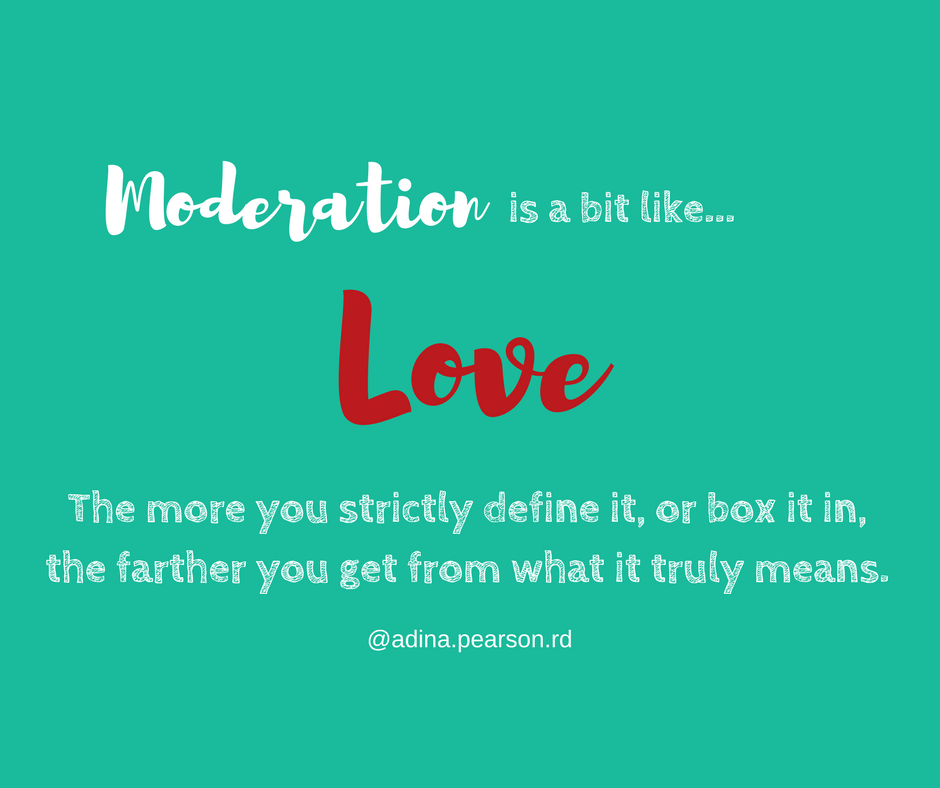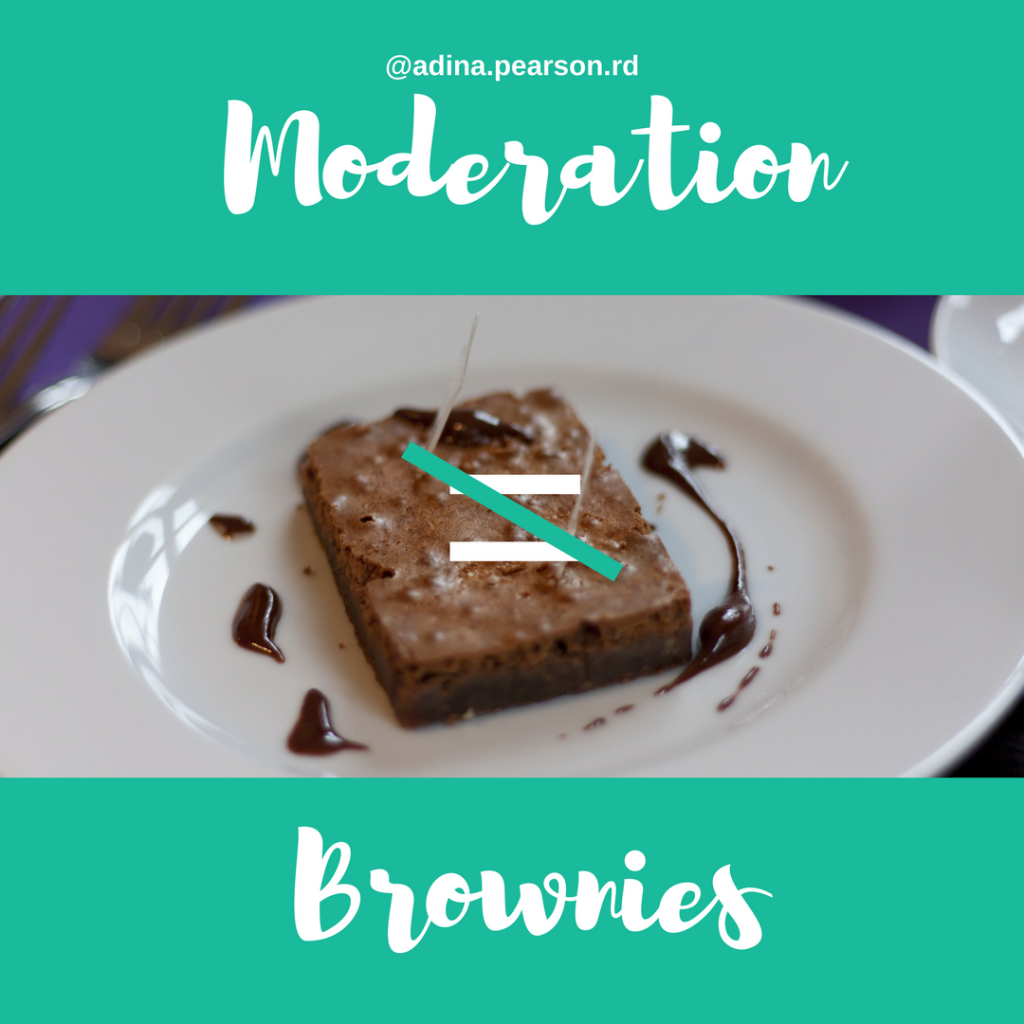Love & Moderation
People either LOVE the concept of moderation or HATE it, thinking it’s too vague, rendering it useless. For example I’ve heard the argument that “everything in moderation” is a stupid concept because, for example, there is no “moderate” number of daily cigarettes--it’s ALL harmful.
But I don’t take that axiom to mean we must consume, do, use or try everything there is in the world. Only that if we do consume, do, use, or try something, it should be in moderation. But what is moderation? The temptation, when it comes to food, is to think it is a perfect ratio, frequency or average of consumption. French fries only this often. Apples and broccoli and salmon this often.
But, again, what if we use cigarettes as the example?
See? It’s murky. And yes, vague.
Words are useless without a concrete, understandable meaning. That doesn’t change the fact that some abstract concepts, like moderation, are hard to define rigidly.
Love
As I was thinking about this definition problem it got me to thinking about the concept of Love. How many songs, poems, and books are there on this topic? How many different definitions and explanations and philosophies are there on Love? Many! It’s not that Love doesn’t have a definition, but that it’s rather abstract, has multiple meanings and is hard to nail down with one sentence.
In some ways trying to rigidly define moderation is a little bit like rigidly defining love.

So this post will be a bit loose and abstract and say a few things I’m thinking, but I’m not sure I’m going to leave you with a super concrete treatise on moderation that you can use to judge your or another’s effectiveness at achieving moderation.
What got me thinking about this topic initially was the frequency with which I saw statements like this:
“I just ate a salad for lunch. AND BROWNIES. Because...moderation.”
Brownies do not = moderation. Brownies, on their own, don’t mean a thing.

Skipping brownies also does not = moderation.
But...in any given situation, it might. Back to murky, vagueness land!
A person in recovery from an eating disorder purposely putting a brownie on their plate is practicing something important. They might not even want to eat the brownie. It might be scary. They are training themselves to feel neutral about a scary “high sugar, high fat” food like a brownie.
Someone else eating a brownie might simply have failed to plan something more nutritious. Or not.
Clearly, moderation is not about a specific act, number, or average. Can you imagine if it was about that? How many charts and numbers you'd have to keep up with?
Oh no...I had cheese X times this week, that means next week I must have it Y times fewer.
Repeat with all the foods.
Madness!
It would totally take over your life.
Instead I think it’s related to balance, yet not about this kind of balance below:

The scale above is perfectly balanced. The left and right are 100% equal. But this kind of balance is a bit of a myth. I love this article on balance that reminds us that balance means a continual shifting and attending to different needs at different times and it will never be ALL taken care of for more than a split second.
So maybe moderation about not getting lost in extremes, then, right? It’s adjusting, shifting, pivoting, re-evaluating. Bringing yourself back to the center. And yet it doesn’t mean that big swings might not happen. Sometimes your attention will be pulled in one direction and you will literally not be able to be all nice and “centered.”
Love = Self-Care
Moderation is also about self-care...and to care about something you have to love it. Not in the butterflies and rainbows infatuation type of love. But in the steadfast, valuing and respecting and meeting the needs of another kind of love. So here we are at love. I wonder if perhaps we can draw up some other comparisons between moderation and self-care and love. At the risk of coming across either blasphemous or too religious, the Biblical description of love in 1 Corinthians 13 is my favorite. It describes it so beautifully, and in this description instead of shrinking love down into this manageable thing with a rigid definition, it expands it:
Love is patient, love is kind. It does not envy, it does not boast, it is not proud. It does not dishonor others, it is not self-seeking, it is not easily angered, it keeps no record of wrongs. Love does not delight in evil but rejoices with the truth. It always protects, always trusts, always hopes, always perseveres.
So what if we replace the word Love with Moderation...or better yet, Self-Care.
Self-care is patient. It knows that health is a big picture type of principle. It’s not about the brownie or the broccoli, but something that evolves over time from a focus on self-care(love). If something doesn’t go ideally one meal, one day, one week, it doesn’t throw in the towel.
Self-care is kind. This speaks of self-compassion. Kindness doesn’t involve beating oneself up for oops, for undershooting or overshooting. It realizes your own humanity. You are not less than for eating more of something one time or better than others because you ate ‘better.’
It does not envy. Self-care means realizing that everyone has different needs and these will differ from moment to moment. No envy of body size, shape, weight or perceived metabolism. No envy of someone else’s portion or perceived self-control. You do you and your body’s needs and wants.
It does not boast about washboard abs, portion-control, or the number of veggies consumed in one meal. It is not proud.
It does not dishonor others who may have different preferences, bodies, resources, skills or thresholds of energy spent on food.
It is not self-seeking. Self-care is not actually selfish. It is about meeting your basic needs. Without that, you can't even think outside yourself or go out and help others effectively. Self-care is also not ego-centric — recognizing that your fitness goals, or eating plans do not need to be the standard other people must follow, or the standard by which you judge others. It's also not about elevating yourself above others. It's not about seeking flattery or applause.
It keeps no record of wrongs. No calorie counting, no creating guilt or shame for foods eaten, no penance through exercise or future restriction. A missed session at the gym or week without veggies doesn’t stack up against us. We just go back to doing the best we can do every day--however that looks in our situation.
Self-care does not delight in evil but rejoices with the truth. It rejects food myths, diet mumbo jumbo, disordered habits and beliefs and relishes in knowing that the body’s self-regulatory system is wise.
It always protects and has your best interest at heart; always trusts, that the body can do its job better than external human created rules.
Always hopes always perseveres. Self-care never fails...at supporting moderation. I think we as humans will always make mistakes, so I won’t pretend that we won’t sometimes suck at self-care. But perhaps looking at moderation as this thing that springs out of self-care, rather than something you can control directly makes more sense. It means you can't look at any one eating incident, meal, day, week, etc and judge it as "moderate" or not. Because the next meal, day, week may look totally different. And a big picture perspective is ultimately what matters.
Zoom out, take it day by day.
When we approach health from a place of self-care, rather than through the ascetic lens of constant denial or perfectionist striving to achieve perfect balance or eat a precise average of this or that, that’s when moderation actually blooms.